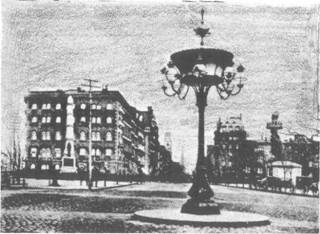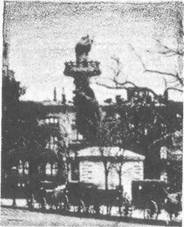I was grinning, genuinely, when I interrupted him. "Yes, you have," I said softly. "You've got a duplicate, and you know it. But it's a long way off, isn't it? Clear down in the basement." I had my notecase out, and I took out a dollar bill. "But it's not as far as I'd have to go to get my own.'' I handed him the dollar. "Come on," I said, "I'll go down with you, and save you the trip back up again."
Two minutes later, climbing the stairs from the basement, I had the key with a dirty paper tag labeled 27 in my hand, but I didn't go upstairs with it. I walked straight through the building, out onto Park Row, and next door in the Times Building I found the locksmith whose sign I remembered, near Nash Crook's Restaurant in the basement floor. He charged me ten cents to cut a duplicate, and I walked back tying the paper tag back onto the original key. Fifteen minutes after he'd given it to me, I handed it back to the janitor whom I found distributing the second-floor mail.
Walking up to the third floor, I realized that I should have tested the duplicate first; but it worked fine. It rattled into the keyhole, caught the tumblers smoothly, revolved; then I turned the knob and stepped into Jake Pickering's secret office.
It was filled with filing cabinets, thirteen of them — I counted — set side by side around the four walls. They were of yellow oak, three drawers high, each drawer with a vertical metal handle. They were scratched and worn, bought second- or third-hand, it occurred to me. Together with the desk and the chair under the window, they filled two thirds of the little office's floor space. I'd taken the key from the lock and closed the door behind me; now I stood listening for a moment. All quiet, and I locked the door. Then as quietly as possible I began pulling file drawers open at random.
Some were very heavy, completely full or nearly so. Most were at least half or a quarter filled; one or two contained only a few inches of papers, and in one of these there was also a pair of rubber overshoes, and in another lay a half-full quart bottle labeled Eagle Whisky. The files were extremely neat, no dog-ears of paper sticking out at the tops or sides, and they were separated by tabbed dividers that were very carefully, almost beautifully, printed in either black or red ink. Mostly these markings were combinations of letters or letters and numbers such as LL4; D; A 6, 7, 8; NN, and so on. There was no consistency I could detect; every drawer held a dozen or more such tabs, and with no understandable relationships in the markings. I also saw a tab marked Repeat, another said Undiv. Both, and another was marked ???. Without lifting any of the papers out, I looked at some of them. Just as Pickering had told Carmody, there were invoices, a lot of them, hundreds and maybe thousands in the thirteen cabinets. And there were receipts and memoranda. There were occasional letters, some on business letterheads illustrated with black-and-white drawings of home offices, or of factories proudly pouring black smoke from every chimney. And there were what looked to be actual signed contracts, folded and tied with red tape. I couldn't tell how the papers were grouped; every file I looked at, no matter how labeled, contained papers bearing dozens or scores of dissimilar names.
The desk's rolltop was up, and I sat down and looked into the pigeon holes and the small upper drawers, touching nothing, just looking. There was a bottle of Daly's Best Bookkeeping Ink, red, and another of black; a little round cardboard box of steel pen nibs; three wooden penholders, all of them chewed at the ends; a scrap of red-and-black-stained rag obviously used as a pen wiper; five unused long blue envelopes; a tan rectangle of chewing tobacco marked with a red metal star; and a folded sheet of paper. This I did touch, taking it out and spreading it flat; the name Jacob Pickering had been written on it in black ink some thirty or forty times, one under the other in a double column. All were clearly in the same handwriting yet greatly varied in style, some much larger and more flowing than others, some very legible, others in a dashing scrawl. He'd been practicing his signature, searching for one he thought most impressive, and I was touched and felt ashamed to be sitting here searching through the man's belongings.
I didn't stop, though, or consider it. I looked through the lower drawers on each side of the kneehole, and saw a cardboard box half filled with unused file dividers; a tumbler of very thick glass which I suspected had been stolen from a restaurant; a pair of leather slippers; two folded newspaper pages which I opened to find a couple of grease spots, some crumbs, and a dry peach pit; a paper sack containing some bread crusts, four or five soda crackers, and an apple going bad; and there was a head-and-shoulders sepia photograph mounted on stiff cardboard of Julia. I touched that, too, taking it out to hold up to the light from the window. It was good; it caught the shine and thickness of her hair, and the knowing, faintly mischievous look her eyes often had even in repose.
I put it away and sat back, looking around the room. Squares and rectangles slightly cleaner than the rest of the wall marked where framed pictures or documents had once hung, and there was an upside-down banjo shape where a pendulum clock had been. Now the walls were naked except for an advertising calendar, marked JUNIUS ROOS SON, PRINTING INKS, and bearing only the last leaf, for December 1880. From the high ceiling hung an upside-down metal T-shape from the ends of which two gas jets projected. The floor was bare wood; beside my chair stood an extremely battered brass spittoon. And that was the office, with absolutely no place to hide.
I walked over to the doorway that led into the next room. It was in the middle of the wall and completely boarded over with half-inch pine boards five or six inches wide and cut fairly neatly to proper length. But they were ordinary pine with plenty of knotholes, and were only roughly spaced with gaps of an inch or more between the boards. The nailheads had been left protruding an eighth of an inch for easy removal. I'd seen a hardware store on Frankfort Street a few doors down from Park Row, and I left now, locking the door. In ten minutes I was back with a hammer, and I slid it through the gap under the bottom board into the empty room, then pushed it just out of sight around the corner. I knew now how I was going to not only overhear but actually see tonight's meeting — only hours away now — and I left.
There was one picture I wanted above all; it was the real reason I'd thought of taking Felix's camera along this morning. And now I took the Sixth Avenue El to Twenty-third Street, walked a block east to the intersection of Broadway and Fifth, and out in the street, protected by a marvelous candelabrumlike streetlamp — Why was it ever removed? — I set my camera on the rim of a large horse-trough, and took this time exposure to eliminate the heavy street traffic. And there it is, in the background at the right, the arm of the Statue of Liberty rising high over the trees of Madison Square.

Here is an enlargement Felix made for me that shows the Statue of Liberty's arm more clearly.

It was nearly noon, I was hungry, and I saw a saloon a dozen steps down Twenty-third Street. I went in, and it looked exactly the way I thought it ought to: a long bar and brass rail, an ornate mirrored back bar, and a table at the rear filled with food. There were stacks of bread, sliced meat — including ham, chicken, turkey, wild duck, and roast beef — potato salad, a big glass bowl filled with dozens of hard-boiled eggs, and pickles, relish, horseradish, mustard, and I know I've missed plenty of other things: sliced pickled beets, for one. It was all free with a five-cent stein of beer, which I ordered, and which tasted different from today's beer. There was much more taste to it, of malt or hops, I think, I'm not sure which. Sipping the beer, I stood eating all the lunch I could manage, and I read a big oak-framed sign over the back bar: gilt letters against a black background on a shiny mirrorlike glass surface. It read: